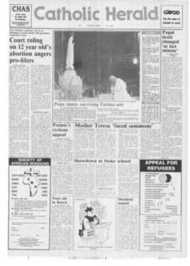Page 10, 17th May 1991
Page 10

Report an error
Noticed an error on this page?If you've noticed an error in this article please click here to report it.
Tags
Share
Related articles
Palestinians In Israel: Smug And Why The Intifada? Scottish?
Children In The Shadow Of The Intifada
Christians On The Move
Extremists On Both Sides Fuel The Middle East Conflict
Patriarch's Remarks On Holy Land Anger Israeli Leaders
Victims of the intifada?
IT appears that the number of Palestinians killed in Israel because of the intifada is considerably higher than has hitherto been generally known.
Although in the eyes of the British and western public — watching pictures on TV news of Israeli soldiers firing on unarmed Palestinian civilians — it is the Palestinians who are the victims of the Zionist state, the truth is rather more complex as those living in the troubled area report.
They tell me that the Palestine Liberation Organisation, mainstays of the intifada which has now been going on since November 1988, is maintaining the uprising by bullying and brutalising ordinary Palestinians into action. Thus under the gaze of western cameras civilians are forced to mount the unarmed stone-throwing attacks on Israeli soldiers hoping to draw their fire by the PLO's intimidation and strong-arm tactics with their families (which go unreported).
As Arafat said on January 19, 1988 (to the Mayor of Jerusalem, Elias Freij): "whoever thinks of stopping the intifada before it achieves its goals, I will give him ten bullets in the chest."
Arafat's side of the case, however,has not lacked protagonists. His defenders were pointing out over a year ago that he was, even then, envisaging a "quick and just" solution to the Palestinian problem. We now know what this was. "We say to the brother and leader Saddam," he said on April 2, 1990, "go forward with God's blessing" (Iraq News Agency).
This was in reply to Saddam's message to Arafat: "You are not alone. . . In the name of Allah, we shall cause fire to devour half of Israel" (April 2, 1990, Iraq News Agency). In Saddam's war with the West, as will be remembered, the PLO was Iraq's firmest ally, though individual Palestinians in Kuwait are now reaping the revenge of the victors for Arafat's posturing,
Royal march
AN association is planning to celebrate the bicentenary of the execution of Louis XVI of France. On January 21, 1993, a "march of reparation" will advance towards the Place de la Concorde in Paris, the site of the revolutionary guillotine that took his life. (The actual date of his death was January 17, 1793).
I gather that the starting point for the march has not yet been settled. I would personally suggest the massive basilica of the Sacre Coeur in Montmartre, the French royal family always having entrusted the safety of France to the Sacred Heart of Jesus.
It often puzzles tourists as to why this great basilica was built in 1870 in thanksgiving for France's having been "saved" when they had just been defeated in war. The answer is that France had been "saved" in the Prussian occupation from the whole country being taken over.
Even the freethinking French government of 1945 chose the Sacre Coeur as the venue for a thanksgiving service for France's liberation.
Today's French royalists are elitist and rather pious. They would probably like the 1993 celebrations to include a mass at the Sacrel Court. But wily President Mitterrand will probably steal their thunder by taking over the occasion, and declaring any elaborate route for the great march to be impracticable for security reasons.
Some hero?
MEANWI III E the Louis XVI Association will be sending a petition to the Pope for the beatification of their "martyred" hero. The petition will be sent on August 25, feast of King St Louis IX (1226 -1270). There is some irony in the choice of date.
Louis XVI, through no fault of his own, knew little of the poor or of intellectual life. He lost his throne, after attempting to flee the country, chiefly through his distaste, as an "obedient" Catholic, for the civil constitution of the clergy.
This measure envisaged a popular rather than a privileged priesthood. In the final analysis, in other words, Louis XVI was frightened of the Pope, and therefore carried out his every command. No such inhibitions afflicted Louis IX who did not automatically support even his own bishops.
Irish peers
AN ingenious exhibition entitled "Avantgarden" is currently on view al the Conservatory of the Barbican Centre, a stone's throw from our office. It was officially opened yesterday by Marina (Lady) Vaizey, the erudite and charming arts critic of the Sunday Tunes.
The Barbican Centre has been more in the news than ever since the recent announcement of a life peerage for its director, Detta O'Cathain. Questions have been asked, however, as to whether she can conscientiously accept such an honour as an Irish citizen (as well as having dual British nationality).
The taking of the "loyal oath" was the main point of contention by the ultimately successful Irish Republicans. Because of this oath, they precipitated civil war rather than subscribe to the 1922 treaty setting up the Irish Free State.
Can an Irish citizen today (albeit also a British subject) conscientiously swear allegiance (as is necessary for taking one's seat in the House of Lords) to "our sovereign lady Queen Elizabeth II"? No such question arises for such Irishmen (and perhaps women) who would, were it not for a strange legal anomaly, be entitled to take their seats in the House of Lords as Irish Representative Peers. This right was granted to them in the Anglo-Irish Treaty of 1800 whereby the Irish Parliament was abolished and merged with that of Great Britain.
This right was never taken away. It was not even mentioned — presumably forgotten — when the 1922 treaty was signed. Fortunately an organisation exists to see if, even at this late date, this anomaly cannot be cleared up.
Test case
THE organisation in question, the Irish Peers' Association, was founded in 1964 to bring their position to public and official attention. The association maintains that a right still exists to elect a maximum of 28 Irish representative peers to the House of Lords. Such a right, it is submitted, exists irrespective of what "nationality" (British or Irish) has been held since 1922.
A test case, featuring a legal judgement by Lord Wilberforce, seemed to suggest that this right of election had been lost legally and not merely by the lack of any appropriate machinery whereby Irish peers could still he elected and summoned to the British Parliament.
Lord Wilberforce, however, has since been interviewed by John Butler who had published a learned dissertation on the whole subject by the late Gerald Draper. The interview confirmed the view that Lord Wilberforce never meant to assert categorically that the right to elect Irish representative peers no longer existed.
Perhaps, then, it still does?
A new test case is eagerly awaited. The cause of AngloIrish friendship could be helped by a positive outcome.
Chiltern haven
THE Irish Peers' Association is meanwhile planning its annual outing for 1991, Its choice of site this year is Stonor Park, near Henley on Thames.
This is, of course, a well known old Catholic ancestral home, originally built in 1190. The Stonor family (with the title of Camoys) have owned it for many years.
It is now open to the public in the summer months on every day of the week at varying times (information from 049163 587).
blog comments powered by Disqus











